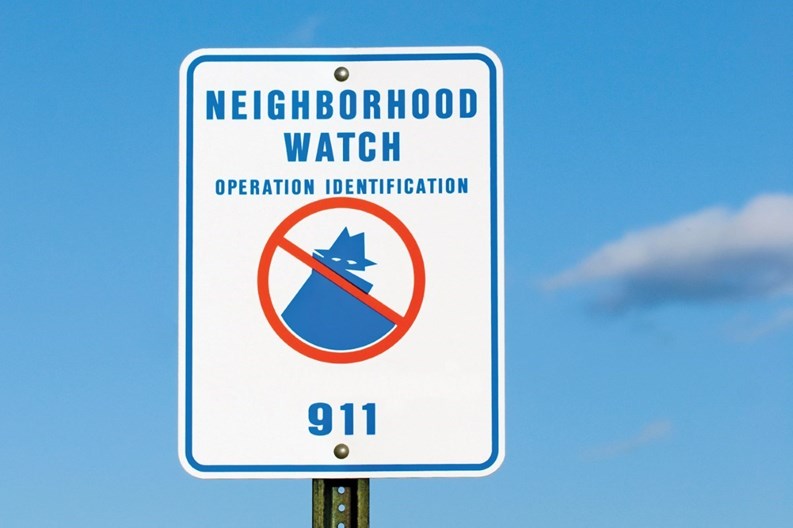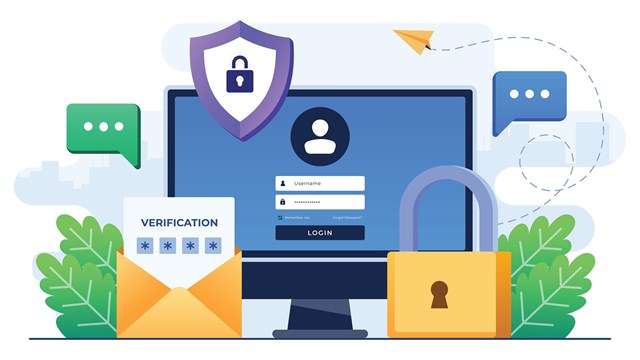Microchip technology and innovations like biometrics and voice recognition devices have revolutionized the residential security industry. Once purely in the realm of science fiction, computers can now perform retinal scans and hand print analysis to verify individuals' identities and grant entry into residential buildings. The future of security technology is definitely now.
But not every building can afford such hi-tech stuff, and many might elect to simply install better lighting or a flesh-and-blood security person in common areas to discourage loitering, lurking or to just keep an eye on things.
There are relatively simple, effective ways that buildings, associations and individual residents can help keep their homes safe and secure without installing a ton of hardware or incurring major expenses. Here’s a look at some common-sense security solutions that any building or HOA can put to use immediately:
Be Your Own Doorman
We’ve all done it. Just as you open the front door of your building, someone happens along, well-dressed and seemingly innocuous, and you do the polite thing and hold the door. As unkind as it may seem to lock someone out, it’s the proper thing to do in that case.
“You’re not impolite if you close the door behind you,” says Jordan Lubitz, the owner of Jordan Intercom & Mailbox Service Company in the Bronx. “Just say, ‘I’m sorry; I don’t know you.' Know you’re doing the right thing by closing the door on someone you don’t know.”
Be Wary of Unlocked Doors
Again, it’s human nature to see something awry at your home and want to investigate. We all have a little bit of Philip Marlowe—or Magnum P.I., if you prefer— in us. In this case, “curiosity can kill more than just the cat.”
“Should you arrive at home and find the door unlocked, and you know you locked it, you should leave immediately and call for assistance,” Lubitz says. “Don’t enter the apartment.”
Be Aware
We have a tendency to relax when we get to the front door of our building, to slow the New York power-walk to a more leisurely pace. Don’t do that. “Stay alert when entering your apartment,” advises the Website Apartments.com. “Don’t talk on your cell phone or look preoccupied when walking toward your building. Criminals look for a weak target and are more likely to pass up someone who appears focused, aware and strong.”
A. J. Caro, the president of Arrow Security in Bohemia, agrees. “People don’t realize that they get followed. If you have a certain kind of car that people might want, they follow you.”
Don’t Scrimp on Locks
You know how in horror movies, the victim has one of those chain locks, and the psycho killer opens it and starts swiping with the knife? Fact or fiction, this is an indicator that chain locks are maybe not so great.
“Never depend on a chain lock to secure your doors to the outside,” says security expert and writer Bryan Dunbar. “Always install a good deadbolt lock.”
This should be done throughout the building, not just for individual apartments. “Maintain decent locks,” says Caro, “and by that I mean deadbolts.”
Lock Your Windows
Remember, this is the city where certain Spiderman imposters scaled landmarked skyscrapers with little more than their bare hands. Just because you live on an upper floor doesn’t mean you should leave your window unlocked and open.
“As silly as it sounds,” Caro says, “they think people won’t get up to that second or third-story window.” They will.
Make Use of Lighting
A well-lit place is anathema to the burglar, who prefers to wait in the shadows. “Lighting is a big issue,” says Caro. “Make sure the lighting on the grounds is maintained.”
In The Autobiography of Malcolm X, the famed civil rights leader recalled his days as a petit larcenist, and advised people living in high-risk crime areas to leave their bathroom lights on at night. A burglar, he said, has no way of knowing if someone is using the bathroom, and burglars generally don’t want to bump into someone while stealing stuff. Lubitz agrees. “Leave the bathroom light on,” he says.
Don't Broadcast Your Absence
In general, the illusion that someone is home is enough to dissuade many potential thieves from entering an apartment. While you should not blast loud music randomly for the entire long weekend you spend upstate—that’s a violation of house rules—Lubitz says, “Leave a TV or radio on when you’re not home.”
Know Your Neighbors—and
Ask Them for Help
Do you know everyone who lives on your floor in your building? If not, you're certainly not alone among New Yorkers. But this, too, can make things less safe in the building. If you don’t know who lives there, how can you tell if someone is an intruder or a legitimate tenant-shareholder?
“Get to know your immediate neighbors, so you can watch out for one another,” Lubitz says. “That’s so important in an apartment building.”
Also, if you're on friendly terms with your nearest neighbors and one of you is embarking on a month-long safari or any other lengthy getaway, you can agree to collect each others' mail and deliveries so they don't advertise your absence by piling up. And, says Lubitz, there's nobody like a friendly neighbor to just generally keep an eye on things in case something goes awry.
Be Aware of Intruders
You call for a pizza. Half an hour later, your intercom buzzes. You hit the button to open the door, thinking that it must be the pizza guy. But it’s not the pizza guy. No one comes to your door—and you now have no idea who you just let into the building.
“The most serious mistake people make is not using the intercom properly,” Lubitz says. “When people are expecting someone, they often release the door without knowing if it’s the person they’re expecting.”
Bottom line: don’t let someone in unless you know who it is. You not only compromise your own safety, but that of all your neighbors as well. Heedlessly buzzing people in can turn common areas into crime scenes. Thieves—and worse—who connive their way into the building proper but can’t get into an individual apartment—have been known to make for low-traffic areas like laundry rooms.
“Avoid using the laundry room by yourself, especially at night,” says Dunbar. “Develop a buddy system.” And if there’s a bathroom down there, make sure it’s the kind that locks and requires a key to open each time.
Protect Your Own
An acquaintance of this reporter once had an apartment in a seedy area of Houston. After a series of failed attempts, burglars finally broke into his place and cleaned him out—by cutting a hole through the wall of the apartment next door. The lesson: sometimes crime does pay, and there’s nothing you can do about it other than be prepared.
“Keep an inventory with the description, serial number and cost of your valuables,” advises Apartments.com. “Keep a copy of those records online, in a fire-proof locked box or in a bank safe deposit box. Take pictures of your most valuable items and attach those to your receipts to make any insurance claims run as smoothly as possible.”
Communicate & Inspect Regularly
The yards of most buildings are fenced in, or secured by attached buildings. On his initial inspections, Caro says that half the properties he assesses are not secure. “You’d be surprised how many holes there are in the fences.” The super, or some other designated person, should check the grounds regularly for signs of entry.
Boards, too, can take some simple steps to help keep their building safe. One tip: remind residents every once in a while on the importance of safety. It sounds silly, but it works. “It’s very useful to occasionally remind residents, maybe twice a year—please remember to do such and such, and give them a list,” Lubitz says.
Another idea: creating a volunteer Community Watch group within the building community. “You’d be surprised how many people will volunteer for that kind of thing,” Caro says.
While biometric fingerprint analysis stations, coded key cards, and motion-activated camera systems certainly are useful options for some buildings, the fact is that even the most sophisticated technology can't wholly replicate the benefit of neighbors remaining alert and aware, and looking out for one another. By making safety and security a priority and communicating that to shareholders and owners, boards can take advantage of the most valuable tool of all—good, old-fashioned common sense.
Greg Olear is a freelance writer, novelist and a frequent contributor to The Cooperator and other publications.







Leave a Comment